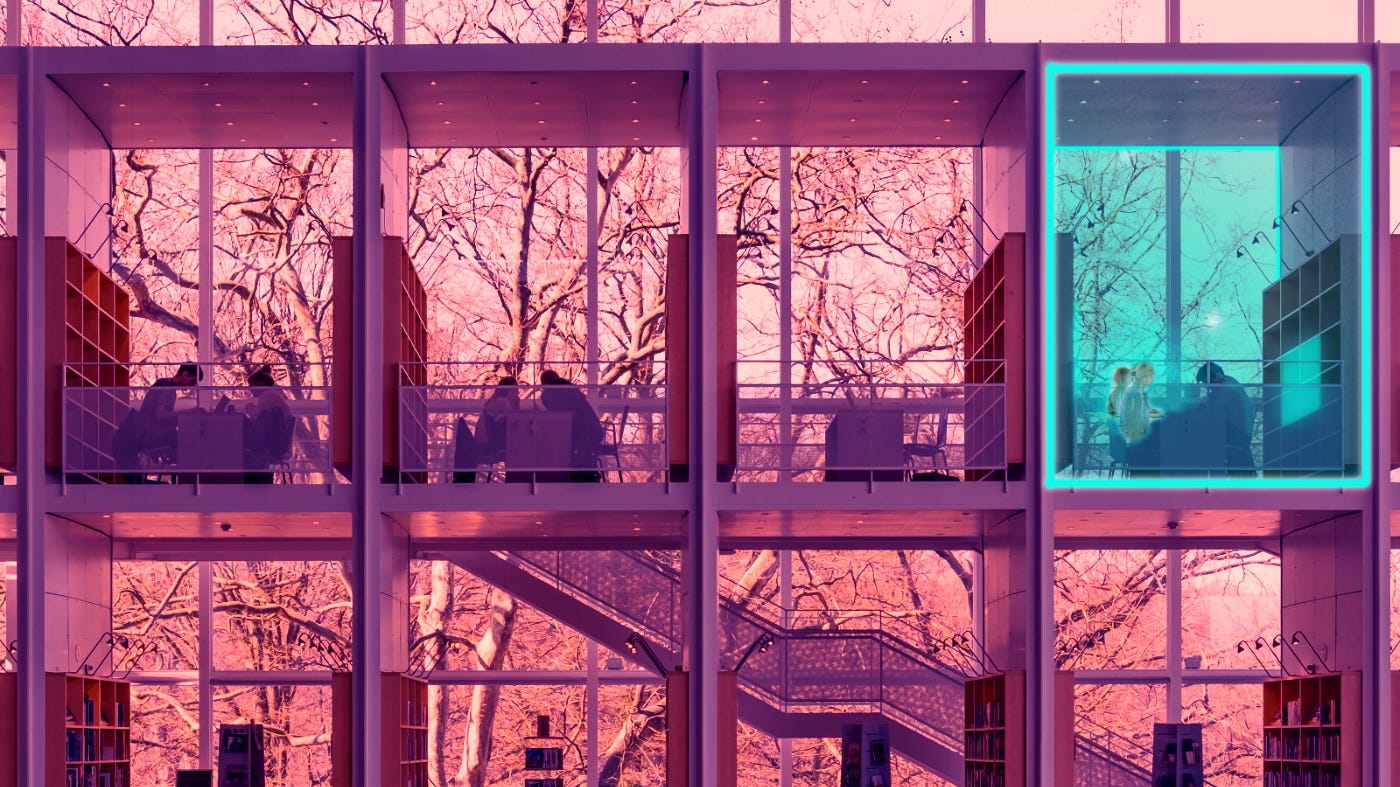A jury of your peer to peers
In this short story, hackers create a system of decentralized governance—but not everyone is included.
The scene through the chamber windows was soothing. Here on the top floor of the library, Laith Shanbezadeh could see the bright blue sky, cumulus clouds blowing eastward across the lake. It was rare that he got moments of solitude like this: no family, no climate migration officers, no school—just him, his thoughts, and the view. All it took was a lunch break during his first time on a jury.
Laith was still a bit unsure what he was doing here. Since the rest of his family had neither membership to any of NetCo’s co-ops nor access to their VPN, they had never served on a jury. And now he had been chosen, and at only age 16, too. It must have been a fluke that he was selected…
Laith was relishing the quiet when the animated jury assistant appeared from the table. “Hello, Laith. Would you like to join a virtual lunch table with Renee and Ali?”
The assistant—the AI recorder, researcher, and reporter for the jury deliberations—dissolved back into the table when Laith accepted its offer. A moment later, real-time holograms of Ali and Renee appeared in their chairs. Rene, a digital patternist, was holoing from her home office in Uptown, and Ali, a college junior studying ceramics, from his campus civics building.
Laith had taken an early affinity to Ali and Renee. They both had a cool confidence about them. Renee seemed to have an inexhaustible knowledge of the city functions; he hoped to one day have a job like hers, constructing healthy virtual spaces and infrastructure. Ali, only a few years older than Laith, seemed so comfortable calling out some of the more senior jurors, and somehow did it with wit and charm.
“So, how does this one compare to other ones you’ve been on?” Laith asked them cooly, trying to mask his curiosity.
Ali yawned and leaned back, briefly disappearing outside the holo feed’s field of vision. “I always brag to my classmates about how radical NetCo juries are. But when we have folks making all sorts of useless tangents, it definitely takes away from the experience.”
“Yeah—tough luck on the jury placement. Honestly, what insights can this motley crew provide about zoning?” Renee added, taking a bite of her onigiri.
“Yeah, but…” Laith paused. Better not to reveal his interest in zoning. “…but at least we don’t have to eat a boring lunch alone.”
Rene sighed. “I miss when you’d be dismissed cause they didn’t need you for a trial. NetCo doesn’t need to hear everyone’s opinion. Who really cares what Bob thinks about housing development?”
“Now hold up there, Renee.” Ali, back on holo, feigned sternness. “Big Bob is an ‘OG techno-hippie.’ Of course we’d want his input!” This got Renee laughing. Regardless of its pertinence to the deliberations, Bob had taken every opportunity to remind the jury that he was a longtime civic tech influencer.
Laith chuckled cautiously. “But the whole point of NetCo’s juries to incorporate as many different people’s input into its design, right?”
Laith recalled that the Network Cooperative emerged after the Cloudbusting in the ‘30s. People formed co-ops to purchase server real estate and digital infrastructure, setting up VPNs and other web services, powered by resources shared by the co-ops. It was designed to give its members greater control over their data and digital communities. And the juries made sure everyone got a say in how the system was run. Supposedly.
Ali put on a look of comical fear. “Oh no, what would we ever do without our OG techno hippie?”
“When Bob said ‘techno-hippies’ like him were to thank for democratic tech, I was done,” Renee snorted. “He definitely didn’t go to high school here.”
“Wait, what do you mean?” Laith asked.
“If he had, he’d have given his crew’s name,” Renee said. Laith stared quizzically.
“Oh my god. You don’t know about the Pirate Crews?” Ali looked aghast. “Renee! Tell him.”
“Y’all making me feel like a senior citizen,” said Renee, motioning to the AI assistant to record her story.
Way before NetCo, when Renee’s mom was a senior at Park, the school district introduced AI mascots: bots to track social cohesion, improve test scores, monitor mental health, and offer recommendations on how to respond to student needs. Admins said the mascots were only about school spirit, but the mascots had huge influence over whether students passed or failed.
The juries made sure everyone got a say in how the system was run. Supposedly.
The kids from the different high schools that hung out at the esports lounge downtown, called the AIs techno-fascist surveillance tools. They believed no one should have that sort of access to their lives without their consent or contribution, and formed the “pirate crews” to push back. The crews hacked into the district’s systems, and Renee’s mom’s crew, the Pirate Panthers, were the first to successfully run their AI on the district servers. Every time the district released a security update, the crews would crowdsource a workaround.
“It went on for a semester until the district finally invited some of them to negotiate. But of course, that generation of students grew up. Some went into mainstream tech—AI, quantum computing, blockchain, cybersecurity—and others, like my mom, stayed local: focusing on civic technology, establishing municipal broadband, supporting entrepreneurs. Most of them stayed skeptical of surveillance by the government and private companies. But they also kept working together, and the result is the tangled hodgepodge of virtual infrastructure and cooperating tech organizations we call NetCo.”
Laith was amazed. He imagined himself as a Pirate, making the web open and secure for folks in the city. “Are you a patternist for NetCo?”
Renee let out an ironic laugh. “Absolutely not! I’m with the city. NetCo is a disorganized collection of co-ops designed by folks trying to reclaim the glory of their techno-anarchist youth. We haven’t figured out democracy in the real world, why would adding technology make it better? They don’t need us to deliberate housing development; they need to hand this case to the planning department and give us our time back.”
Ali made a face. “I agree, NetCo brings in too many randos now. But I doubt a bunch of bureaucrats would do any better—”
“NetCo doesn’t include everyone,“ Laith blurted out. There was an uneasy silence. I guess I have to explain to them now, he thought. “I’m one of the few climate-displaced people that I know who’s ever been invited to a jury. We assumed CDP status precluded us from participating.”
“You’re a CDP! That’s why you’re not holoing in.” Renee exclaimed.
A look of surprise, and perhaps disgust, seemed to cross Ali’s face, but it was hard to tell for sure through the hologram. “I’m surprised you got selected for a jury. I know CDP aren’t really interested in engaging with the community—”
“Woah,” Renee cut in. “That’s a huge assumption to—”
“But it’s true—”
Laith knew the familiar stereotype, and felt his chest tighten—maybe he couldn’t be friends with these people outside after all. “It’s not disinterest! We never get asked and no one’s ever listening!”
“Maybe you feel that way,” Ali huffed. “But automatic registration for government elections and NetCo juries when you’re 16—”
“But it’s not automatic if you’re older than 16, and to register or serve on a jury you have to be a resident. And if you move here and you’re older, there’s nothing automatic about it.”
“All of the CDPs I went to school with moved into a NetCo house after a year or two.” Ali replied.
“There aren’t homes for families like mine—extended families. Twelve of us share a three-bedroom apartment, and we’re typical. The new homes being built are for tiny, wealthy nuclear families; not homes that CDP families can both afford and stay together in. It’s clear they don’t care about what we want—”
“Okay, but NetCo analyzes your engagement when you use their VPNs, even if you aren’t officially serving on a jury. So at least they see your preferences and habits.”
“We get internet from the Bureau of Climate Migration, not NetCo. Also, we don’t want to be tracked by NetCo or the municipal broadband. The Pirates didn’t either.”
There was another silence, interrupted by the jury assistant’s chime. “Attention, jurors. The lunch recess will be ending. Would you like to save this recording?”
“I forgot about the assistant. We can just delete this conversation,” Rene offered, sounding embarrassed.
“Listen—Laith, I obviously don’t know enough about CDPs.” Ali conceded. “But you just gave us some pretty good data. Maybe if we upload it, we can improve NetCo’s selection algorithms.”
Laith didn’t say anything. He wished he shared Ali’s faith in the Pirates and the Network Cooperative they created. He wondered if Renee was right to be wary of NetCo’s idealism. Thinking of his family, he wondered if a system designed without CDPs in mind could truly adapt and include them?
He took a deep breath and swiped the table, sending the recording to NetCo.
As the other jurors began holoing in, Laith turned to the windows again, taking in the clouds over the lake, the gulls in the wind, the people on the shore. Maybe he was where he was supposed to be.
Lafayette Cruise is an urban planner and futurist. His practice engages projects at the intersection of urban planning and speculative fiction in order to imagine, plan, and build a more equitable, just, and sustainable future.
Design by Josh Kramer. Photo by Ciprian Boiciuc, via Unsplash.





